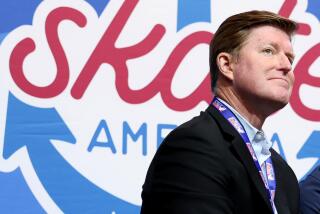WORLD SPORTS SCENE / RANDY HARVEY : Skating’s Aversion to Pros? No Figuring It
- Share via
Brian Boitano recently wrote a column for Newsweek’s “My Turn” section, in which he lamented the possibility that he will never have another one. Not a column--he will be writing one for a national newspaper from the Winter Olympics at Albertville, France--but a turn.
Boitano already has had two turns in men’s figure skating at the Winter Games, finishing fifth in 1984 at Sarajevo, Yugoslavia, and then returning four years later at Calgary, Canada, to win the gold medal with a performance that ranks among the best in the sport’s history.
Four years later, Boitano, 28, is skating as well as he did in the weeks leading to the Calgary Olympics, at times even better because of his maturity and confidence, and would like nothing more than another opportunity to test himself on figure skating’s ultimate stage. Instead, he will be confined to the press seating in February at Albertville.
That is the result of typically shortsighted thinking by the International Skating Union (ISU), which has liberalized its eligibility rules somewhat since 1988 but not enough to allow skaters such as Boitano, Canada’s Brian Orser, Germany’s Katarina Witt and America’s Debi Thomas to skate in the World Championships or Olympics because they have earned prize money in nonsanctioned professional competitions.
Of course, none of those skaters has won one-tenth the amount of money Steffi Graf and Stefan Edberg and Michael Jordan earn each year, but professional tennis and basketball players are eligible for the Olympics because their sports have seen the future and joined it. Figure skating moves in that direction at the speed of a glacier.
Discussing reaction to his Newsweek column in a recent interview, Boitano said: “People ask me, ‘Why do you want to compete in the Olympics again? You’ve already won a gold medal.’ I tell them, ‘It’s not about winning. It’s about being able to do what you want in your field, and I want to compete at the highest level.’ ”
The sad truth for figure skating fans who will be watching the Winter Olympics is that, as has become increasingly apparent this year, no men’s competition is an expression of the sport at its highest level unless Boitano is in it.
The latest Nutrasweet World Challenge of Champions Friday at Oslo, Norway, involving Boitano, two-time Olympic silver medalist Orser, 1980 Olympic champion Robin Cousins and 1984 Olympic champion Scott Hamilton, produced better men’s performances than any amateur competition this year and probably will not be surpassed at Albertville.
As has been the case in all eight of his professional competitions since 1988, Boitano won at Oslo. All nine judges scored him with perfect 10s. Equally satisfying for him was the knowledge that among the crowd was Olaf Poulsen, president of the ISU.
Perhaps Poulsen will become a convert, recognizing that the sport cannot be at its best without the professionals, and the rules will change in time for the 1994 Winter Olympics at Lillehammer, Norway.
If not, some professionals are threatening to band together under the banner of the Professional Skaters Guild of America and begin a tour of five to 10 competitions a year that might afford enough commercial opportunities and pay enough prize money to lure the better amateurs away from the ISU. In that case, the ISU, like tennis’ governing body did so many years ago, will have to become open to professionals or become obsolete.
“We have to make the ISU start thinking,” Boitano said. “If we start this, they might not have anything without us.”
He remains active with his two professional competitions a year and his three-year-old traveling ice show, in which he shares top billing with Witt.
The show, which will be at the Forum on Dec. 27 and the Sports Arena at San Diego on the next night, received media raves throughout the country last year, and Boitano said he believes this production, Chrysler Skating ‘92, is better.
One thing virtually certain is that audiences will see an honest performance from Boitano. Some skaters in ice shows promise complicated double and triple jumps and then deliver something less, realizing that only a few spectators have the trained eyes required to know the difference.
But if Boitano promises a triple axel, he delivers a triple axel. Or he at least tries. Night after night, that becomes wearing, physically and mentally. But in more than one sense of the word is Boitano a professional.
More to Read
Go beyond the scoreboard
Get the latest on L.A.'s teams in the daily Sports Report newsletter.
You may occasionally receive promotional content from the Los Angeles Times.






